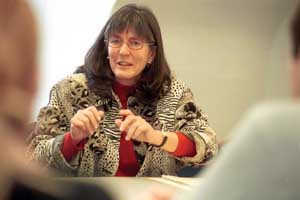Investigations
Hand
jive
Expressive
talkers have an ally: Susan Goldin-Meadow, professor of psychology,
believes grandma was wrong when she told you not to flap your
hands when telling a story.

"Talking
with our hands may actually make thinking easier," says Goldin-Meadow,
who recently studied such motions with Howard Nusbaum, associate
professor and chair of psychology, Spencer Kelly, AM'98, PhD'99,
and doctoral student Susan Wagner. The group reported their findings
in the November Psychological Science.
The
study's participants, 40 children and 36 adults, were asked to
solve age-appropriate math problems. After solving each problem
they were given several words (for children) or letters (for adults)
to memorize. Next, the participants were asked how they arrived
at their solutions to the math problems. During the explanations
some were permitted to gesture, and the others were not. Finally,
after completing their explanations, the subjects were asked to
recall the list of items. Both adults and children remembered
over 20 percent more words and letters if they had been allowed
to gesture while explaining their math solutions.
"These
findings suggest that gesture reduces the cognitive load of explanation,"
says Nusbaum, "freeing capacity that can be used on a memory
task performed at the same time."
How
can gesturing "free" up thinking resources? Perhaps,
speculate the researchers, gesturing divides up the work of an
explanation, allowing people to draw on visual, spatial, or motor
capacities in addition to verbal capacity. "This might allow
gestures to facilitate information processing and reduce effort,"
Nusbaum says.
The
research garnered lots of media attention, including a limerick
on NPR's November 17 game show Wait, Wait-Don't Tell Me!:
If
your brain doesn't meet high demands
Here's some gestures to loosen your glands.
Put 'em up in the air,
Shake 'em like you don't care.
You'll be smarter if you use your hands.
-S.A.S.

![]()
